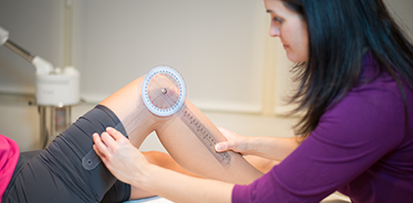By using this site, you are consenting to our use of cookies. To find out more visit our privacy policy.
The ABPTS Maintenance of Specialist Certification (MOSC) is a model for certification that focuses on continuing competence of the physical therapist specialist. This page covers MOSC Requirement 2: Commitment to Lifelong Learning Through Professional Development.
You are obligated to participate in ongoing professional development within your designated specialty area that leads to a level of practice consistent with acceptable standards. You may choose to pursue professional development that leads to a level of practice beyond prevailing standards.
A web-based system to track continuing competence in a specialty area provides an individual tracking mechanism for you to record professional development activities throughout your 10-year certification.
You must show evidence of professional development activities (equivalent to 10 MOSC credits) within two of the three designated activity categories in years three, six, and nine. By year nine, you must have accrued a minimum of 30 MOSC credits and demonstrated professional development in each of the three designated activity categories. These activities include professional services, continuing education coursework, publications, presentations, clinical supervision and consultation, research, clinical instruction, and teaching.
Professional activities completed in year 10 may be applied to the next three year MOSC cycle to fulfill requirements.
See below for additional details and examples of how you can earn MOSC credits:
Minimum Eligibility Requirements of MOSC
Category 1
Accrual of 200 Direct Patient Care Hours
1 MOSC credit (maximum of 5 MOSC credits in each three-year cycle).
Note: Accrual is beyond the minimum required hours of 200 every three years.
Accrual of 200 Clinical Supervision, Mentoring, and Consultation Hours
1 MOSC credit (maximum of 5 MOSC credits in each three-year cycle).
- Clinical supervision (entry-level physical therapist students and physical therapist assistant students).
- Mentoring
- Residents (accredited residency programs).
- Peer professionals (formal job role/responsibility).
Professional Services
Each worth 1 MOSC credit (maximum of 5 credits cumulative across subcategories in each three-year cycle).
- Subject matter expert.
- Committee/board participation (including ABPTS, specialty panels, and other specialty-related appointments).
- Task force or work group (ABPTS, APTA section or component-sponsored; or other professional organization).
- Item writing (1 MOSC credit for every 5 items accepted by specialty panel for board exam for ABPTS specialty certification).
- Committee content expert, such as a CCE, appointed ABPTS position. Must serve a full term, unless term could not be completed due to professional advancement in another ABPTS position).
- Administrative activities.
- Starting a residency or fellowship program.
- Community service in clinical specialty area.
- Other.
Category 2
Completion of a CE Course
1 MOSC credit for every 10 contact hours (specialty-related CEU).
ABPTS Approved CEUs
You may view courses in the APTA Learning Center that have been approved by ABPTS Specialty Panels for MOSC credit in your specialty. To find relevant courses, filter by practice area under the "Search by Category" dropdown and select your specialty from the list. This is intended to be a resource for specialists in search of courses to satisfy their Category 2 requirement, but continuing education is not limited to what you may find in the Learning Center. Coursework may come from a wide variety of providers, so long as it falls within the specialty area.
Completion of an Accredited Residency, or Fellowship
Successful completion of an ABPTRFE-accredited residency or fellowship program in a designated specialty practice area meets all requirements for one three-year MOSC cycle.
Completion of College or University Course
5 MOSC credits.
Teaching a College or University Course
- Serving as primary instructor/coordinator – 5 MOSC credits.
- Serving as assistant for the course – 2 MOSC credits.
Note: You may count each course only once in each three-year cycle.
Teaching a CE Course
2 MOSC credits for every hour of teaching (maximum of 5 MOSC credits in each three-year cycle).
Note: You may count each course only once in each three-year cycle.
Category 3
Professional Presentations
MOSC credits vary by presentation (maximum of 5 credits cumulative across subcategories in each three-year cycle).
- Peer-reviewed presentations (each worth 2 MOSC credits):
- Platform or poster presentation.
- Invited speaker. - Non-peer-reviewed presentations (each worth 1 MOSC credit):
- In-service presentations.
- Presentation to professional groups.
- Presentation to client-based groups.
- Presentation to community groups.
- Panelist at forum.
- Participation in a journal club.
- Other.
Professional Writing (Authorship/Editorship)
(maximum of 5 credits cumulative across subcategories in each three-year cycle).
- Peer-reviewed writing (each worth 3 MOSC credits):
- Book chapter, peer-reviewed journal article.
- Grant proposal, primary investigator or co-investigator.
- Book chapter, peer-reviewed journal article.
- Case study or case report.
- Home study module.
- Editor
- Other. - Non-peer-reviewed writing (each worth 1 MOSC credit):
- Non-peer reviewed publication.
- Reviews or commentaries.
- Manuscript reviewer.
- Hooked on evidence.
- Professional meeting abstract reviewer.
- Other.
Research Activities
Each worth 1 MOSC credit (maximum of 5 credits cumulative across subcategories in each three-year cycle).
- Contributions to Physical Therapy Outcomes database.
- Contributions to physical therapy research project.
- Participation in an ABPTS revalidation study.
- Research summit participation.
- Other.



